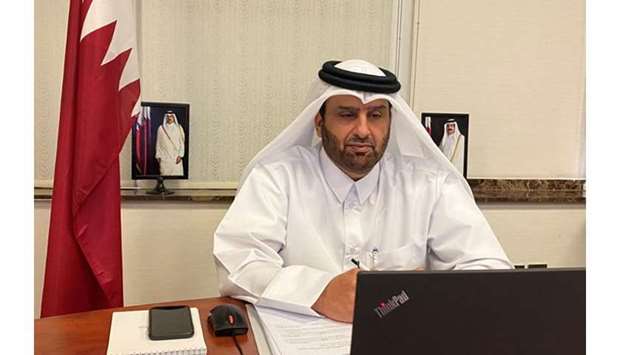Qatar participated on Wednesday in the 45th Technical Council meeting of the GCC Standardization Organization.
Chairman of Qatar General Organization for Standardization and Metrology (QGOSM) Engineer Mohammed bin Saud Al Musallam represented Qatar in the meeting that was held via virtual communication technology.
The meeting discussed a number of important topics, including the memorandum of the presidency of the Standardization Organization on the developments in the implementation of the Authority's strategic plan during 2016-2020. It includes the targeted results of implementing the plan, which are facilitating trade exchange between member states, enhancing access to global markets, developing industry, small and medium enterprises and ensuring consumer safety.
The meeting also discussed the memorandum of the presidency of the Standardization Organization regarding the Authority’s strategic plan during 2021-2023, which includes the mission, vision and objectives that it seeks to achieve and for which the Authority was established, which is to unify the various standardization activities and follow up on their implementation and commitment to them in co-operation and coordination with the standardization bodies in member states.
This will be done in a way that contributes to developing its production and service sectors, developing trade, protecting consumers, the environment and public health, and encouraging GCC industries, products and services in order to support the economy, preserve the gains of GCC countries and contribute to reducing technical barriers to trade in line with the objectives of the customs union.
Through this strategic plan, the member states are anticipating in a new phase of constructive and fruitful cooperation and are looking forward to completing the quality infrastructure in the GCC countries with the aim of integrating the various standardization activities.
At the 45th meeting, the Technical Council reviewed strategic projects according to priority and their links to the objectives, which are setting up a rehabilitation program and the participation of the GCC countries in unifying the GCC standardization mechanisms. Other programs include the program for completing the harmonization of standardization services in light of the decisions of the Supreme Council, the program for addressing national restrictions that hinder the flow of goods, creating and activating a unit for studies and research in the Authority to strengthen its position as a house of expertise at the regional and global levels, and the development of a plan to strengthen the partnership with regional and international organizations. In addition to developing the Authority's comprehensive governance system by increasing coordination and enhancing communication to align business between different departments.
The strategic map, performance indicators and initiatives were discussed, in addition to the results of the analytical studies and online questionnaires reviewed by the national standardization bodies.

